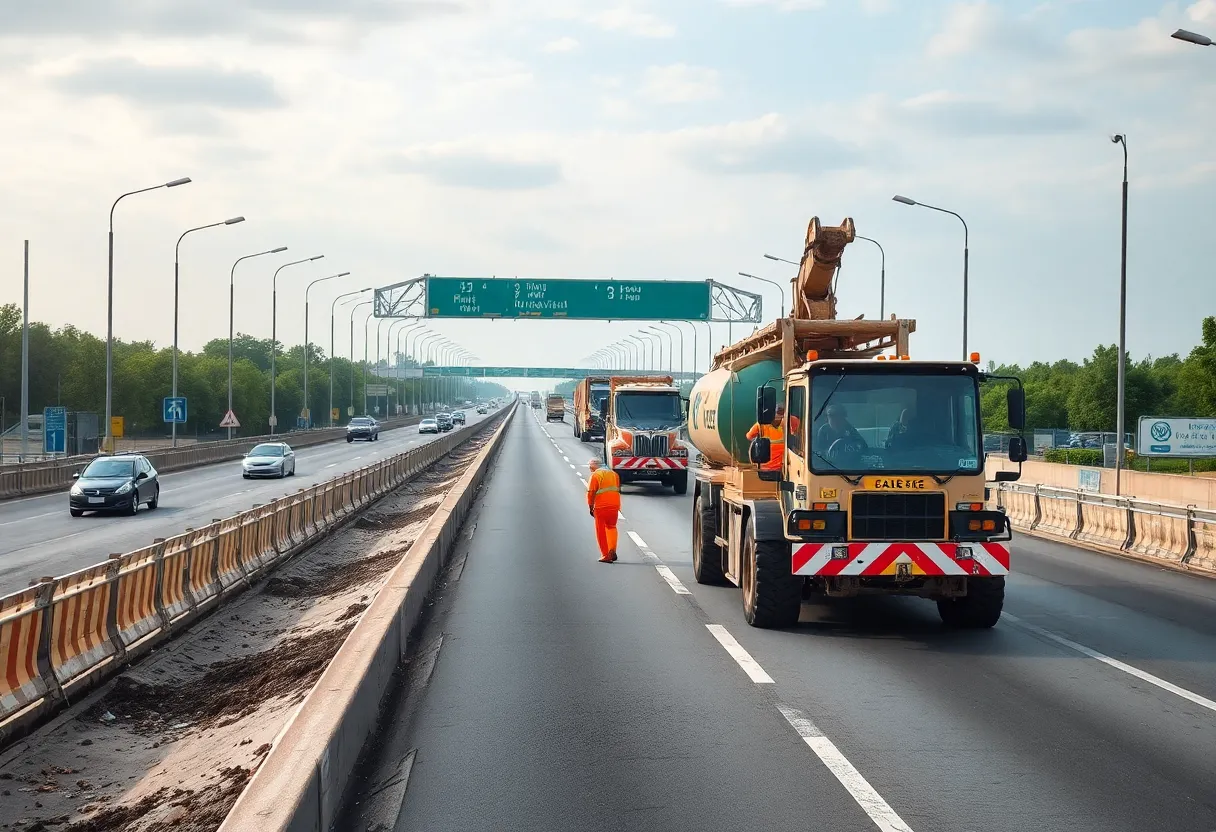Washington, D.C., August 14, 2025
News Summary
Rep. Sam Graves has outlined four essential priorities for the upcoming surface transportation reauthorization bill as Congress prepares to address funding and key focuses for highway and transit infrastructure projects. With projections indicating potential insolvency of the Highway Trust Fund by 2028, lawmakers are urged to prioritize formula funding, streamline permitting processes, increase state flexibility, and identify new revenue sources. Environmental review reforms and alternative funding mechanisms, such as vehicle-miles-traveled fees, are also considered crucial for ensuring robust infrastructure support in the years to come.
Graves outlines four priorities for the next surface transportation reauthorization
The congressional agenda for the nation’s highways and transit systems includes a clear plan from the chair of the House transportation and infrastructure committee, who has laid out four main goals for the upcoming surface transportation reauthorization bill. The proposal signals how funding levels, project timelines, and policy changes could shape road and rail projects for years to come. Lawmakers are in the early stages of crafting the bill, with more than a year to reach agreement before the current authorization expires.
The current timeline runs until September 30, 2026, at which point the existing authorization ends and a new framework must be in place to keep highway and transit work moving. A central factor facing negotiators is the financing outlook for the Highway Trust Fund, which is projected to reach insolvency by 2028. This potential funding gap underscores the urgency of identifying sustainable revenue streams and efficient funding mechanisms in the next bill.
Officials from the U.S. Department of Transportation and other key lawmakers are aligning with industry groups on several priorities, aiming to accelerate project delivery and reduce red tape. Major construction groups have pressed for ensuring that program funding reaches projects quickly, with a stronger emphasis on formula funding over discretionary grants, a stance echoed by capital project planners who stress that formula funds typically spend faster and reach states more reliably.
In a broader context, the bill would build on the framework of the Infrastructure Investment and Jobs Act of 2021, which allocated more than $560 billion to the Department of Transportation, including a $305 billion five-year surface transportation reauthorization. The emphasis on formula funding is seen as a way to allocate dollars to states without the delays sometimes associated with competitive grant programs, a point supported by state transportation officials who note that discretionary funds often lag in actual spending.
Graves’ four priorities
- Prioritizing formula funding — Projects receive timely financing based on established formulas, reducing the delays associated with competitive grant processes.
- Permitting reform to shorten project timelines — Streamlining environmental and regulatory reviews to move projects from planning to construction more quickly.
- Providing states more flexibility — Offering governors and transportation departments greater leverage in choosing how funds are deployed across highways, transit, and related projects.
- Identifying new revenue sources for the Highway Trust Fund — Exploring alternatives to reliance on the traditional fuel tax to maintain long-term funding stability.
Beyond these four goals, policymakers and industry groups are looking at how to expand the use of NEPA Assignment, a program that lets states take on responsibility for environmental reviews under the National Environmental Policy Act. Participation has been limited so far, with eight states involved, but supporters say the approach has delivered faster project delivery in those cases. Other efforts aim to expand the One Federal Decision policy to speed up environmental reviews for major projects, aligning federal and state processes to shorten timelines without sacrificing thorough analysis.
The funding discussion also covers where money comes from. The current Highway Trust Fund relies heavily on the federal gas tax, which has not been raised since 1993. In response, Graves has proposed examining additional revenue sources, including registration fees on electric and hybrid vehicles, along with possible use of vehicle-miles-traveled fees as a supplement or alternative to the gas tax. Some groups are calling for maintaining current funding levels while accounting for inflation, while others have floated more expansive investments for public transit and passenger rail in the coming years.
During negotiations, industry groups advocate for maintaining or increasing the scale of formula funding to ensure predictable support for states, arguing that it supports steady construction spending and timely project delivery. Civil engineering associations have suggested indexing transportation user fees to inflation to preserve purchasing power, and several analyses highlight the ongoing tension between raising revenues and keeping transportation affordable for users. The overarching challenge remains clear: finding a sustainable funding approach that keeps pace with rising construction costs and growing demand for highways and transit.
In summary, the next surface transportation authorization will have to balance efficiency and speed with long-term financial stability. Four policy goals, a push for permitting reform, a call for additional funding options, and a strategic preference for formula funding all frame the current discussions. The outcome will shape how and when major projects proceed, how quickly environmental reviews are completed, and how the federal government—and the states—invest in the nation’s transportation backbone over the next several years.
Key facts at a glance
- The bill will set funding levels and project priorities for highway and transit infrastructure for multiple years.
- Lawmakers have more than a year to finalize legislation before the current authorization expires.
- The Highway Trust Fund faces insolvency projections for 2028.
- Discretionary grant funding tends to be slower in spending than formula funding.
- Eight states participate in NEPA Assignment with reported project delivery improvements.
- Current gas tax revenue has not been increased since 1993, prompting consideration of new sources like EV/Hybrid vehicle fees and potential VMT fees.
Where the discussion stands
Overall, the focus remains on creating a predictable, efficient funding structure that supports long-range planning and timely project delivery. The balance between maintaining strong funding levels, expanding state flexibility, and introducing new revenue streams will shape the path forward for federal transportation policy in the coming years.
Key features chart
Frequently asked questions
What are the four priorities outlined for the next surface transportation reauthorization?
The four priorities are prioritizing formula funding, permitting reform to shorten project timelines, providing states more flexibility, and identifying new revenue sources for the Highway Trust Fund.
When is the current surface transportation authorization set to expire?
The current authorization expires on September 30, 2026, giving lawmakers more than a year to complete the next bill.
What is the status of the Highway Trust Fund?
The Highway Trust Fund is projected to reach insolvency by 2028.
What is NEPA Assignment and why is it being considered?
NEPA Assignment allows states to take on responsibility for environmental reviews under the National Environmental Policy Act, and expansion has shown potential for faster project delivery.
What revenue sources beyond the gas tax are being discussed?
Options include registration fees on electric and hybrid vehicles and possibly vehicle-miles-traveled fees as complements or alternatives to the gas tax.
Deeper Dive: News & Info About This Topic
Additional Resources
- ENR: Construction Groups Float Goals for Next Surface Transportation Funding Legislation
- Wikipedia: Transportation in the United States
- Transport Topics: Sam Graves Tapped Again
- Google Search: Surface Transportation Reauthorization Bill
- Roll Call: In a Party of Firebrands, Graves Sidesteps Limelight
- Encyclopedia Britannica: Highway Trust Fund





